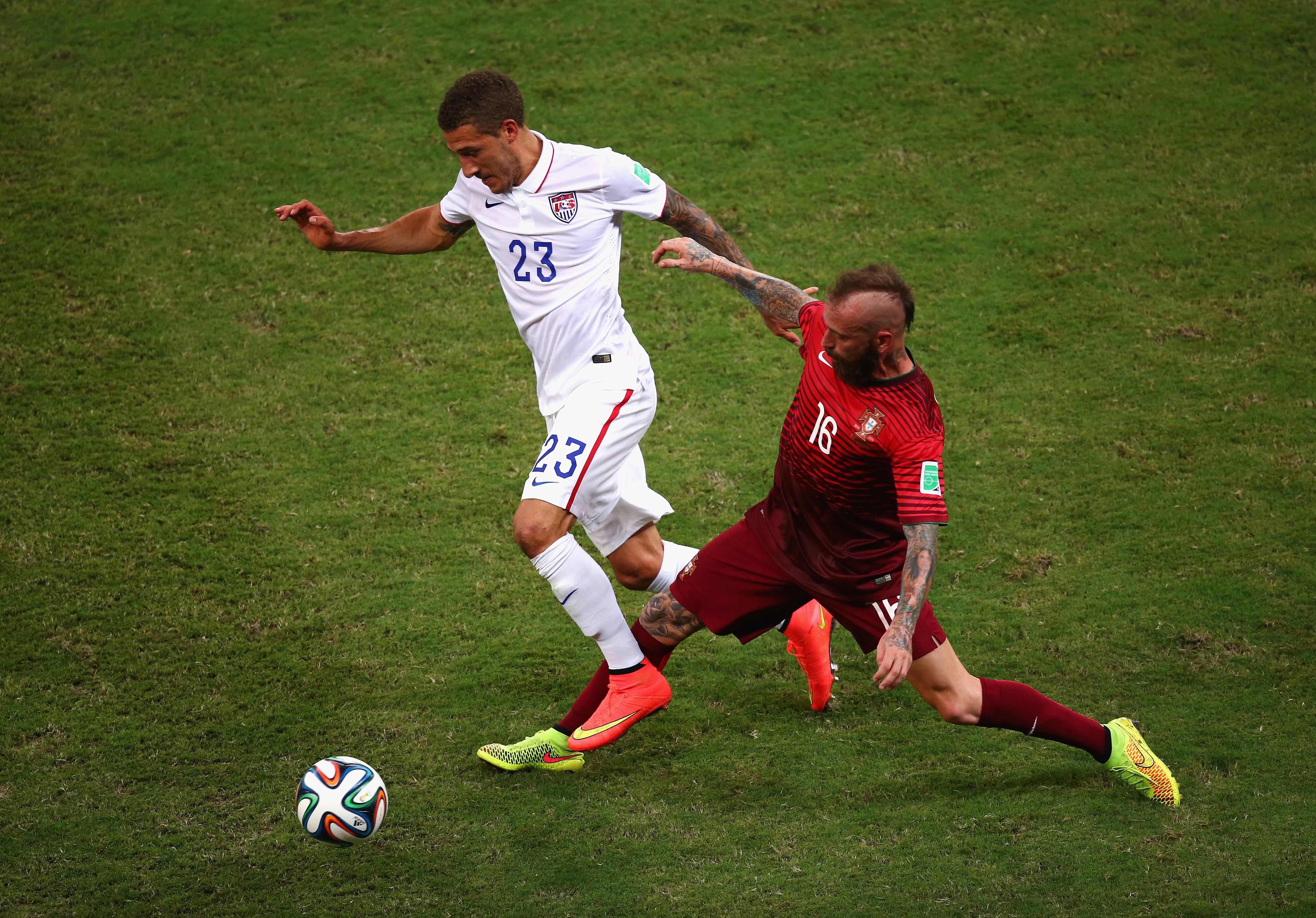The German-American wing of the U.S. men’s national team is having a spectacular World Cup. Defender John Brooks smashed home a header to give the U.S. an unlikely 2-1 victory over Ghana. Midfielder Jermaine Jones, who curled in a stunning strike in the Americans’ 2-2 draw with Portugal, has looked like the squad’s best player. But neither has been as fun to watch as Fabian Johnson. The right back spent Sunday night bombing down the flanks, creating chance after chance. Over the weekend, ESPN broadcaster Adrian Healey even deemed him “the best German fullback at the World Cup.” Take that, Die Mannschaft!
Though the Borussia Mönchengladbach-bound 26-year-old’s performance in Brazil has been revelatory, we really should’ve seen it coming. In fact, two days before the U.S.’s opening game, Sports Illustrated’s Grant Wahl said that Johnson could be a breakout star. So far at least, that glowing assessment is spot on.
What makes Johnson so effective? Most obviously, it’s his speed. Take this moment from Sunday’s Portugal match. With the U.S. on the offensive in the 55th minute, winger Graham Zusi slipped a pass to Johnson, who sprinted forward, took possession near the edge of the box, and dribbled to the end line before expertly tapping the ball back to an on-rushing Michael Bradley.
Bradley didn’t score (inexplicably), but that shouldn’t detract from Johnson’s perfect setup. And this was far from his only moment of brilliance. Ten minutes in, he took off on a 40-yard run down the right side, latched onto a pass by Jones, cut in, and fired a left-footed shot that ricocheted off defender Bruno Alves and out of play. Shortly thereafter, the swashbuckling Johnson earned a free kick from a few yards outside the box.
In its match report, soccer tactics site Zonal Marking praised Johnson’s work, calling him “a real attacking force throughout the game.” If he does have a weakness, it’s that he occasionally neglects his defensive duties. Against Ghana, Johnson won the corner that led to Brooks’s game-winning goal, but his lapse on the other end of the field helped lead to Andre Ayew’s tying strike.
Johnson’s constant push forward, however, appears to be by design. As Zonal Marking pointed out after the Ghana game: “The statistics sum up his display—just one tackle, no clearances and no interceptions, yet he attempted more dribbles than any other player.”
Offensive-minded defenders aren’t new to U.S. soccer—both Tony Sanneh (2002) and Steve Cherundolo (2010) attacked with great aplomb in previous World Cups. But neither of those men were as fast and skilled as Johnson. Not many players in the world are.
Finding the next Dani Alves in the States—or anywhere else, for that matter—isn’t easy. America has long fielded rosters dotted with players raised in other parts of the world. Thomas Dooley (Germany), Earnie Stewart (the Netherlands), Roy Wegerle (South Africa), and David Régis (Martinique/France), all suited up for the U.S. in World Cups, but none were superstars.
Here’s where German-born Jürgen Klinsmann comes in. The U.S. coach, an internationally renowned, World cup-winning striker, is apparently a better recruiter than John Calipari. As Icelandic-American forward Aron Jóhannsson told Brian Sciaretta of the New York Times last September, “If Jürgen Klinsmann calls me and says he wants me to play for the United States, then it would be pretty hard to say no.”
It also helps if your homeland isn’t exactly lusting after your services. None of the five German-Americans currently on the U.S. team—Jones, Brooks, Johnson, Timmy Chandler, and Julian Green—likely would’ve made Germany’s 2014 World Cup roster. If the Germans knew Johnson would play this well in Brazil, though, they surely would have found a place for him.
Five years ago, the Munich-born player, whose father was an American serviceman, seemed destined for greatness in his home country. He was a member of Germany’s European Championship-winning under-21 side, on which he played with future stars Mesut Özil, Sami Khedira, and Manuel Neuer. But though he has played for multiple first-division German clubs, Johnson never made it to his nation’s senior squad. He accepted Klinsmann’s invitation to join the U.S. in 2011.
Assimilation, Johnson recently told SI’s Wahl, was not a problem. “From the beginning you feel like you are part of this group. The whole team and staff helped me out.” On Thursday, Johnson and the U.S. get a crack at Germany with both teams’ World Cup hopes on the line. “I am half-American and half-German,” he told German newspaper Bild before the World Cup. “I am really looking forward to the match. But right now I don’t have any special feeling.”
I’d be willing to bet that his feelings have changed. Johnson may not admit it, but he’s likely itching to prove that the country he now represents isn’t merely a fallback option, but rather an actual World Cup contender. If any single U.S. player has the power to prove that point, it’ll be him.
